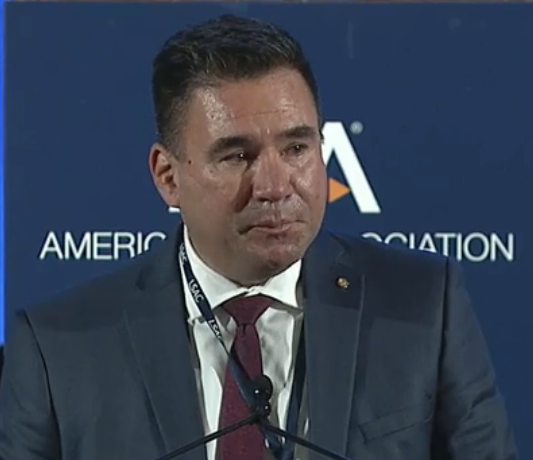
- Details
- By Levi Rickert
CHICAGO — In a resolution with multiple requests, the American Bar Association (ABA) House of Delegates, a 597-member policy body, is calling on Congress to conduct oversight hearings on Indian boarding schools. The resolution was adopted by the ABA Monday evening.
The adopted resolution, Resolution 801, also urges all individuals, governments and organizations to support the U.S. Department of Interior’s Indian Boarding School Initiative and the Truth and Healing Commission. The new federal effort partners with tribal nations and organizations to investigate the extent to which the United States established forced boarding schools to eradicate Indigenous culture, similar to an effort ongoing in Canada.
Want more Native News? Get the free daily newsletter today.
As Resolution 801 was presented to the House of Delegates, outgoing ABA President Patricia Lee Refo said she visited the Navajo Nation — the first ABA president to visit the nation’s largest Indian reservation — where a conversation arose about Indian boarding schools.
Her visit was in July and she said the resolution was crafted quickly.
“This resolution was born during my official visit to the Navajo Nation where I had the privilege to meet separately with the president of the Navajo Nation, the speaker of the Council and the entire Navajo Nation Supreme Court,” Refo said.
Refo then introduced Brad Regehr, president of the Canadian Bar Association, who is the first indigenous person to ever hold this role. He is a citizen of the Peter Ballantyne Cree Nation in Saskatchewan.
Regehr provided an overview of the Canadian Truth and Reconciliation Commission that has worked for over a decade on examining Indian residential schools in Canada.
He choked up as he recounted how his grandfather attended a residential school and how he reacted to the news of the disclosure of graves of children as young as three-years-old at residential schools this spring and early summer.
“It has hit me hard, and continues to hit many Indigenous people hard, but it has also hit many Canadians hard for the first time ever,” Regehr said.
Regehr urged members of the House of Delegates to approve Resolution 801.
In addition to the resolution calling on Congress to hold a hearing, it also urges the United States and Congress to fully fund and provide subpoena power to the U.S. Dept. of the Interior’s Federal Indian Boarding School Initiative; enact the Truth and Healing Commission School Policy Act or similar legislation; use all reasonable efforts to obtain boarding school records; ensure the repatriation of all relevant items and remains; and direct the Federal Indian Boarding School Initiative to conduct meaningful consultation with tribal nations on all aspects of the Interior Department’s Federal Indian Boarding School Initiative.
According to a report accompanying the resolution, by 1909, there were more than 175 boarding schools and more than 300-day schools in the United States.
The resolution was adopted with overwhelming support by a 293-10 vote.
“NCAI welcomes the support of organizations and allies that recognize the vast importance of accounting for the atrocities faced by Native children during the boarding school era. The Department of the Interior’s Federal Indian Boarding School Initiative is a step forward in not only discovering the truth and reconciling the past, but also helping Native families heal for the future. We are encouraged by the American Bar Association’s resolution of support and look forward to pushing this critical work forward," Nationcal Congress of American Indians (NCAI) President Fawn Sharp said to Native News Online.
Monday’s resolution follows decades of previous resolutions that have been adopted by the ABA in support of treaty rights, human rights issues impacting Indian Country.
Tell Us What You Think
More Stories Like This
Native News Weekly (August 25, 2024): D.C. BriefsNavajo Utah Commission Approves Six New Weather Stations
First Peoples Fund Announces 2026 Cultural Capital Fellows
Deb Haaland Campaign Responds to Why Her Name is in the Epstein Files
Cadiz, Inc. Announces EPA Selection of Mojave Groundwater Bank Northern Pipeline Project for WIFIA Loan Application
Help us defend tribal sovereignty.
At Native News Online, our mission is rooted in telling the stories that strengthen sovereignty and uplift Indigenous voices — not just at year’s end, but every single day.
Because of your generosity last year, we were able to keep our reporters on the ground in tribal communities, at national gatherings and in the halls of Congress — covering the issues that matter most to Indian Country: sovereignty, culture, education, health and economic opportunity.
That support sustained us through a tough year in 2025. Now, as we look to the year ahead, we need your help right now to ensure warrior journalism remains strong — reporting that defends tribal sovereignty, amplifies Native truth, and holds power accountable.
 The stakes couldn't be higher. Your support keeps Native voices heard, Native stories told and Native sovereignty defended.
The stakes couldn't be higher. Your support keeps Native voices heard, Native stories told and Native sovereignty defended.
Stand with Warrior Journalism today.
Levi Rickert (Potawatomi), Editor & Publisher

